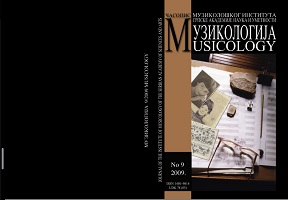Светлост Слова у „музикословљу“ Љубице Марић
The Light of the Word in Ljubica Marić’s Music
Author(s): Zorica MakevićSubject(s): Music, Sociology of Art, History of Art
Published by: Muzikološki institut SANU
Keywords: God the Logos; light; solemnity; Ljubica Marić; Octavocet; Music of octoys;
Summary/Abstract: Ljubica Marić’s music provides manifold encouragements for consideration in the light of the Logos, according to the teaching exposed in the prologue of the Gospel by St. John. It speaks of the essential inconceivability of time and life, which have their cause in God and His Logos. Seeing through and praising ‘the logos of things’ guide all its aspects: the tone reveals itself as a vibration, as the energy of lasting and existing, as the beginning of every time and motion; the sonority of different instrumental media is freely expressed and mutually determined in co-action with specific musical and contextual moments; the rhythm evades every regularity and mechanicalness, by which both single durations and the whole metro-rhythmic course gain a vivid expression. The entire shape of the work is also taken from the reality of psychological and historical time, from its unreductable dynamics, being always in a vivid connection with the space, origin and tradition. The respect for ‘the truth of things’, the awe before the mystery of time and existence, which call upon the very principle of life in the divine Logos, are obvious in everything. Designation of man as a being of light and reason, created in the image of God to be the likeness of His being, is expressed in Ljubica Marić’s music by the measure of human pulse taken as the basic tempo of her entire opus. Ljubica Marić expressed her consciousness of the reason as a special gift to the man by extremely careful treatment of the words – its meanings, melodies, rhythms, which she always considered the very source of music. The relation between the word and the voice – its sonorous body – is shown in the cantata Songs of Space (1956) as a mystery of the encounter of the Logos and the matter. In relation to her earlier works, this one is a marked breakthrough of the composer’s authentic ‘voice’, which will find its full identity only after receiving the divine Word, symbolized by the melodies of the Serbian Octoechos in the cycle Musica Octoicha (1958–1963). Thus, Ljubica Marić’s music has entered its ‘New Testament’ time and become a specific story of the Logos and His presence in the world and history. In the opaque and dramatic course of that related musical time, the melodics of chanting is experienced as the manifestation of the light, meaning, reason, freedom, awe. These graceful effects bring into the work a certain beyond-time dynamics – inverse perspective of time – and, like a Byzantine church dome, they bear witness to the divine condescension. Ljubica Marić’s music is steeped in the mystery of the beginning and the end, which meet in eternity, in the One who is Alpha and Omega; in its one tone and in its entire course, it grasps the whole of time and existence – through the divine Word itself by which it has also been made.
Journal: Muzikologija
- Issue Year: 1/2009
- Issue No: 9
- Page Range: 65-82
- Page Count: 18
- Language: Serbian

